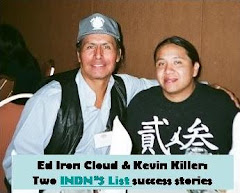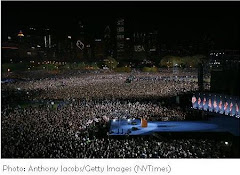 It was a dark night (March 24, 1989) in the Gulf of Alaska when the Exxon Valdez ran aground and spilled over eleven million gallons of crude oil into the pristine waters of Prince William Sound. The oil spill devastated marine life, wildlife, fish, birds and all of the people who relied on the riches of this beautiful ecosystem for their livelihood. Here we are, almost 20 years later, and Exxon (a corporation whose net profits topped 40 billion dollars in 2007) still has not yet made good on the payment of a judgment that was rendered against them over fourteen years ago by a federal court judge and jury. Why the delay? In a word, GREED.
It was a dark night (March 24, 1989) in the Gulf of Alaska when the Exxon Valdez ran aground and spilled over eleven million gallons of crude oil into the pristine waters of Prince William Sound. The oil spill devastated marine life, wildlife, fish, birds and all of the people who relied on the riches of this beautiful ecosystem for their livelihood. Here we are, almost 20 years later, and Exxon (a corporation whose net profits topped 40 billion dollars in 2007) still has not yet made good on the payment of a judgment that was rendered against them over fourteen years ago by a federal court judge and jury. Why the delay? In a word, GREED.The following account is from the Alaska Daily News (08/04/98):
Apparently, delay pays. The fishermen, Alaska Natives and others who are still waiting to be paid a $5 billion judgment [subsequently reduced by a court decision to 2.5 billion dollars] in the massive Exxon lawsuit, are earning, by court order, interest at $9.40 a second. That's $564 a minute, $33,840 an hour, $812,160 a day or $296 million a year. Many of the attorneys representing the plaintiffs have what they call the ''Exxon clock'' on their office computers. It displays what looks like an old-fashioned gas pump meter that runs nonstop showing the dollars adding up.
While those numbers are impressive, consider this: Exxon is earning $90,000 an hour, about $2 million a day or nearly $800 million a year, on the same $5 billion as long as the case drags on and the money stays in its coffers.
As it stands now, if the appeals linger a couple more years, Exxon will have earned enough in interest alone to pay the $5 billion plus the accrued interest. And the case could linger at least that much longer. When the jury verdict was returned four years ago, Exxon vowed to fight the decision all the way to the U.S. Supreme Court. Right now it's before the 9th U.S. Circuit Court of Appeals in San Francisco.
The difference between what $5 billion earns for the plaintiffs and for the company itself is the catch.
Though the verdict was returned in the fall of 1994, the interest clock didn't start ticking for the plaintiffs until two years later when federal court Judge Russel Holland completed the task of examining post-trial motions and entered an order upholding the jury's verdict. Exxon then filed an appeal interest started accruing for the plaintiffs. And the interest accumulates at the government-set rate of 5.9 percent a year.
But until it actually has to pay the money, Exxon has been able to invest its billions in expansion and a bull market on Wall Street. Exxon is posting 14 percent to 17 percent earnings, its annual reports show.
The discrepancy has left the plaintiffs' attorneys frustrated. ''It's in their interest to screw over the fishermen,'' said Brian O'Neill, a Minneapolis attorney who represented the 30,000 fishermen, Natives, business owners and others who were awarded the judgment for damage done by the 11 million gallons of oil spilled by the Exxon Valdez oil tanker in 1989.
''Every year they are able to stretch the appeal out, they make a billion dollars out of it,'' said Gerry Nolting, another Minneapolis attorney who represents the plaintiffs. ''It is unfortunate that we have a system set up that readily encourages Exxon to engage in every frivolous appeal in the world.''
Exxon didn't want to talk dollars.
''We're not going to get into a discussion of who is earning what on what,'' said company spokesman Ed Burwell. ''That is not the point.''
John Daum, a Los Angeles attorney who represents Exxon in the case, said the point is the oil company doesn't control the timing of the appeal, the court does.
''We think the basic verdict is unjust, and we don't think we have to pay it,'' he said. ''We have a due process right to get the court of appeals to correct the errors of the jury and the trial court.''

The good news for the plaintiffs who are still alive is that Samuel Alito has recused himself, as he holds Exxon stock, so a split (4 - 4) decision upholds the judgment. But for too many of the Native fishermen and other Alaskan residents this money will come too late. Over 6000 of the original plaintiffs have died waiting for compensation from a corporation that made over 40 billion dollars last year. Shame on Exxon/Mobile and all those who support this greedy oil market (including the president, vice-president and all the other officials who are complicit in this highly polluting industry that does not apparently have a conscience at all, let alone any sense of responsibility for the horrible devastation that their company has visited on the Alaskan coastline.) The case will be heard by the Supreme Court on Wednesday, February 27, 2008.
Exxon Valdez Oil Spill Trustee Council
Legacy of the Exxon Valdez oil spill (Alaska Daily News)
The Encyclopedia of Earth - Exxon Valdez Oil Spill

































































No comments:
Post a Comment